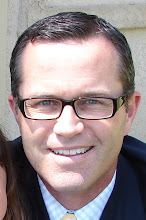 Phillipe Petit - World Trade Center - August 7, 1974
Phillipe Petit - World Trade Center - August 7, 1974I find myself at the edge of opportunity. A stepping off point that is at once unexpected and the result of years of passionate exploration and refinement. It's as if I have suddenly arrived at a place I have been hoping to visit for a very long time. It's the moment - I think of my wedding day, becoming a father, giving my first significant speech - when anticipation gives way to experience. The feelings are fascinatingly polarized: this is exactly what I thought it would be AND I am an intruder in someone else's experience because this is certainly not my life!
As I consider the path that is opening up before me I find myself suddenly aware (if I am to inhabit this foreign land with fullness and belonging) of how much focus, energy and discipline it will take to walk it well. It feels like the difference between a walk on the beach and a walk on a tightrope.
On the beach: sand giving way under foot, footprints straying up and down the waterline; not quite directionless but a coming and going that is marked by neither intensity nor purpose. It is a wandering of the very best kind. Lose my balance and my pant legs get wet.
On the tightrope: eyes on the horizon, pole leveled for balance; one foot at a time testing the tension of the wire, the body relaxed and contained. Every move unified by the connection of body and mind. Lose my balance and I fall down and away, no longer going towards.
My challenge at this new frontier is to get into a rhythm that reflects my priorities. To give form and focus to the opportunity is to learn to deny that which will take me off balance. To move away from the comforting distractions - the wandering - and to find the relaxed containment necessary for a joyful journey across the tightrope.
I find deep inspiration in the story of Phillipe Petit, whose incredible feat of walking a wire between the Twin Towers, is brilliantly captured in the documentary "Man On Wire." His was truly a joyful journey.
© 2010 David Berry



